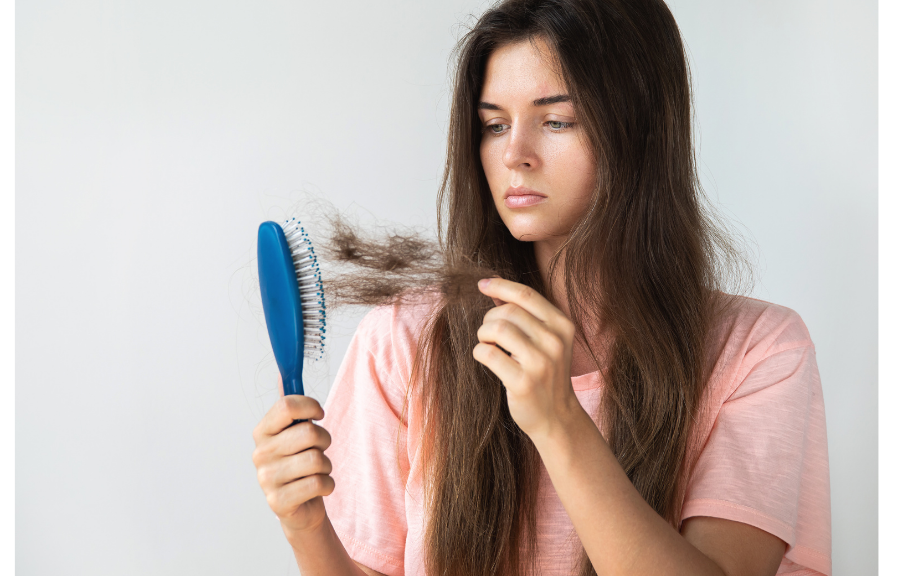
Dr. Jim Johnson
With 15+ years of experience, Dr. Jim Johnson is a leading dermatologist specializing in hair and scalp health. His research on Redensyl, Baicapil, and Capixyl helped shape ALIKA, a Vietnamese brand that harnesses nature’s power for healthier, stronger hair.
- Dr. Jim Johnson
- March 24, 2025
We all know stress can take a toll on our overall well-being, but did you know it can also wreak havoc on your hair? That constant feeling of being overwhelmed, anxious, or under pressure doesn’t just affect your mind—it can lead to thinning, breakage, and even significant hair loss for both men and women.
As a specialist in hair and scalp health, I’ve seen firsthand how chronic stress can silently sabotage even the healthiest hair. The scary part? Many people don’t even realize the connection until they start noticing excessive shedding.
So, how exactly does stress lead to hair loss? Let’s break it down in a simple way.
The Stress-Hair Loss Connection: It’s All About Hormones
When you’re stressed—whether from work, relationships, finances, or just life—your body enters “fight or flight” mode. This triggers the release of cortisol, a hormone essential for short-term survival but problematic when constantly elevated due to chronic stress.
How Cortisol Disrupts Your Hair Growth Cycle
Your hair grows in three main phases:
Anagen (Growth Phase): Hair actively grows, lasting for years.
Catagen (Transitional Phase): Hair growth slows, and follicles shrink.
Telogen (Resting Phase): The follicle becomes inactive, and the hair eventually sheds.
When cortisol levels remain high, they can prematurely push hair follicles from the growth phase into the resting phase. Think of cortisol as an uninvited guest kicking everyone out of the party early! This leads to a condition known as telogen effluvium, causing excessive shedding a few months after the stressful event.
Other Stress-Related Hair Conditions
Stress can also trigger:
Alopecia Areata: An autoimmune condition causing sudden hair loss in patches.
Trichotillomania: A compulsive urge to pull out hair as a response to stress.
Signs That Stress Is Affecting Your Hair
How can you tell if stress is behind your hair problems? Look out for these signs:
✔ Increased Shedding: More hair in your brush, pillow, or shower drain.
✔ Overall Thinning: Hair feels less dense, and your scalp may become more visible.
✔ Dry, Brittle Hair: Stress can disrupt oil production, making hair dry and prone to breakage.
✔ Itchy, Irritated Scalp: Stress-related inflammation can lead to an itchy or flaky scalp.
The Good News: You Can Reverse Stress-Related Hair Loss!
The best part? Stress-induced hair loss is often reversible. By managing stress levels, you can help restore your hair’s natural growth cycle.
Here’s how:
✨ Practice Mindfulness & Meditation: Even a few minutes a day can lower cortisol levels.
🏋️ Stay Active: Exercise is a great stress reliever—whether it’s yoga, running, or dancing.
💨 Try Deep Breathing Exercises: Slow, deep breaths help activate the body’s relaxation response.
😴 Prioritize Quality Sleep: Aim for 7–8 hours of restful sleep each night.
🥗 Eat a Balanced Diet: Support hair health with nutrient-rich foods like fruits, vegetables, lean protein, and healthy fats.
❤️ Stay Connected: Spending time with loved ones helps buffer stress.
💬 Seek Professional Help: A therapist or counselor can help if stress feels overwhelming.
A Real-Life Story (Brief & Non-Branded)
I once worked with a client, Sarah, who experienced significant hair thinning after a stressful year. They were understandably frustrated. But by incorporating mindfulness, exercise, and dietary improvements, they saw noticeable hair regrowth within a few months. It wasn’t an overnight fix, but reducing stress made all the difference.
Final Thoughts
Don’t let stress steal your shine—or your hair! Understanding the link between stress and hair loss is the first step in taking control. By managing stress effectively, you can protect your hair and restore its natural health.
Your hair’s health starts with your well-being. Take care of both!






